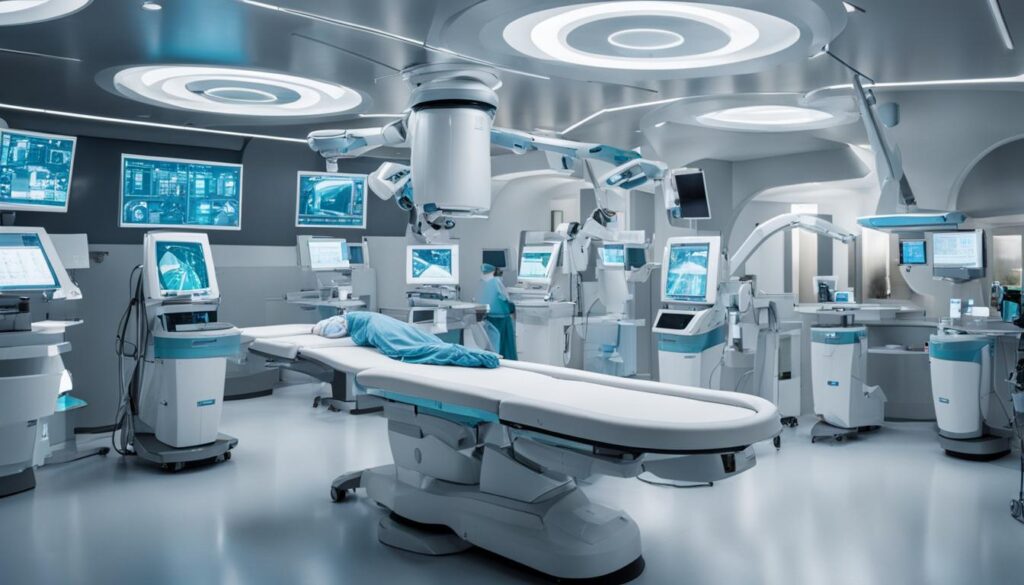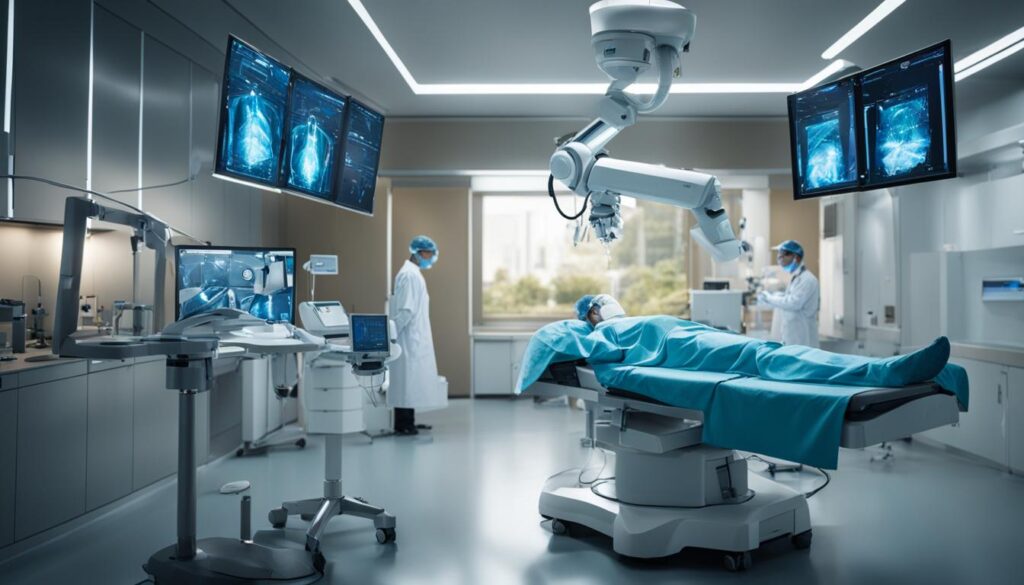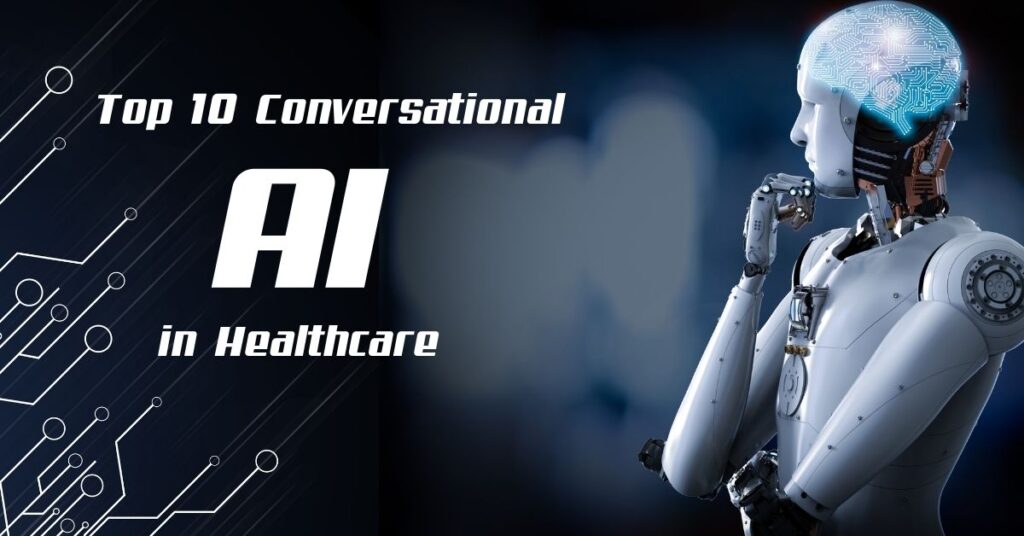
- The Impact of AI in Healthcare
- Technological Advancements in AI
- AI Applications in Healthcare
- Prevention and Diagnosis
- Improving Healthcare Access and Delivery
- Cost Reduction and Efficiency
- Technological Potential of AI in Healthcare
- The Future of AI in Healthcare
- Implementing AI in Healthcare Organizations
- Conclusion
- FAQ
Artificial intelligence (AI) is revolutionizing patient care in the healthcare industry. With the advancements in AI technology, there are unexpected ways it is saving lives. From diagnostics to treatment planning, AI is being used to enhance and improve healthcare delivery. This article will explore the various applications of AI in healthcare and the impact it is making in saving lives.
Medical artificial intelligence, also known as healthcare AI, is transforming the way healthcare is delivered. Through the use of machine learning algorithms and AI-powered healthcare systems, AI technology is enabling healthcare professionals to make more accurate diagnoses, develop personalized treatment plans, and improve patient outcomes.
AI healthcare software is being used in a wide range of applications, including administrative workflows, image analysis, robotic surgery, virtual assistants, clinical decision support, and connected machines. These AI-driven healthcare innovations are revolutionizing healthcare access and delivery, reducing costs, and improving efficiency.
As AI continues to advance, its potential to transform healthcare is immense. However, it is crucial to address the ethical considerations and challenges associated with AI adoption in healthcare organizations. By ensuring the responsible use of AI and prioritizing patient safety, healthcare providers can harness the power of AI to improve patient care outcomes and transform the future of healthcare.
The Impact of AI in Healthcare
Artificial intelligence (AI) is transforming the healthcare industry in remarkable ways, revolutionizing patient care and saving lives. Through its various applications and advancements, AI is enhancing healthcare delivery and improving outcomes. Machine learning, precision medicine, ambient assisted living, natural language programming, and machine vision are some of the key areas where AI is making a significant impact.
AI Applications in Healthcare
- AI is being used to streamline administrative workflows, reducing the burden on healthcare personnel and improving efficiency.
- Image analysis powered by AI allows for more accurate and timely diagnostic interpretations, aiding healthcare professionals in decision-making.
- Robotic surgery is being assisted by AI technology, enabling precise and minimally invasive procedures.
- Virtual assistants powered by AI are providing personalized support to patients, helping them manage their health and access relevant information.
- Clinical decision support systems powered by AI are improving diagnostic accuracy and treatment recommendations, leading to better patient outcomes.
- Connected machines and AI-driven monitoring systems enable continuous patient monitoring, providing real-time health alerts for timely interventions.
- AI is also playing a crucial role in targeted and personalized medicine, tailoring treatments based on individual characteristics and genetic profiles.
The Role of AI in Precision Medicine
Precision medicine, which focuses on tailoring healthcare interventions to individual patients, is greatly benefiting from AI applications. By analyzing vast amounts of patient data, including genetic information, AI can identify patterns, predict treatment responses, and guide personalized treatment plans. This allows for more effective and efficient care, as well as improved patient outcomes.
AI in Ambient Assisted Living
Ambient assisted living, where technology is used to support independent living for older adults and individuals with disabilities, is another area where AI is making a significant impact. AI-powered systems can monitor daily activities, detect falls, remind individuals to take medications, and provide assistance with tasks such as cooking and cleaning. These solutions enhance safety, improve quality of life, and enable individuals to maintain their independence for longer periods.
Related Post: The Top 10 Conversational AI for Healthcare in 2024
Technological Advancements in AI
The field of AI has seen significant technological advancements in recent years. One of the key breakthroughs has been in the area of deep learning, a technique based on artificial neural networks. Deep learning has transformed the capabilities of AI applications, allowing them to process and analyze vast amounts of data with incredible precision and speed.
Companies like IBM Watson and Google Deep Mind are at the forefront of these advancements, showcasing the power of AI in surpassing human performance in various tasks. IBM Watson, for example, has been instrumental in medical research and diagnosis, providing healthcare professionals with valuable insights and recommendations based on large datasets.
These technological advancements in AI have paved the way for its adoption and impact in healthcare. By leveraging deep learning and artificial neural networks, healthcare organizations can harness the power of AI to enhance patient care, improve outcomes, and revolutionize healthcare delivery.
The Power of Deep Learning
- Deep learning enables AI applications to process and analyze vast amounts of data with precision.
- Artificial neural networks mimic the behavior of the human brain, allowing AI systems to learn and make predictions.
Examples of AI Advancements
- IBM Watson has demonstrated the capabilities of AI in medical research and diagnosis.
- Google Deep Mind has achieved breakthroughs in tasks such as image recognition and natural language processing.
These advancements have immense potential for improving healthcare outcomes and transforming the way healthcare is delivered. However, it’s important to address ethical considerations and ensure responsible use of AI to maximize its benefits while minimizing risks.
AI Applications in Healthcare
Artificial intelligence (AI) is revolutionizing the healthcare industry by transforming various aspects of patient care. Its applications in healthcare are diverse and far-reaching, with the potential to enhance administrative workflows, improve diagnostic accuracy, and optimize treatment outcomes. Let’s explore some key areas where AI is making a significant impact in healthcare.
1. Streamlining Administrative Workflows
AI technology is being used to automate and streamline administrative tasks in healthcare organizations, freeing up valuable time for healthcare professionals to focus on patient care. From appointment scheduling and billing to data entry and documentation, AI-powered solutions help optimize administrative processes, reducing errors and improving efficiency.
2. Advancing Image Analysis
AI algorithms are revolutionizing medical imaging by enabling faster and more accurate analysis of scans and images. By leveraging machine learning techniques, AI systems can detect patterns and anomalies that may be missed by human radiologists, leading to earlier and more precise diagnoses. This not only improves patient outcomes but also enhances the overall efficiency of diagnostic workflows.
3. Supporting Robotic Surgery
Robotic surgery is a rapidly evolving field in healthcare, and AI plays a vital role in enhancing its capabilities. AI-powered robotic systems assist surgeons during procedures by providing real-time feedback, enhancing precision, and improving surgical outcomes. With AI-enabled robotic surgery, healthcare providers can offer minimally invasive procedures with greater accuracy and reduced recovery times.
4. Enabling Virtual Assistants and Clinical Decision Support
Virtual assistants powered by AI technology are transforming the way healthcare professionals access and interact with patient information. These virtual assistants can retrieve patient data, answer queries, and provide real-time clinical decision support based on the latest evidence and guidelines. By supporting healthcare providers in their decision-making process, AI-powered virtual assistants enhance patient care quality and efficiency.
These are just a few examples of the wide range of AI applications in healthcare. From connected machines and dosage error reduction to cybersecurity and robotics-assisted surgery, AI continues to revolutionize the healthcare landscape. Embracing AI technology in healthcare organizations can lead to improved patient outcomes, enhanced operational efficiency, and a more sustainable healthcare system.
Prevention and Diagnosis
When it comes to saving lives, AI plays a crucial role in the prevention and diagnosis of chronic non-communicable diseases. With the power of machine learning, AI algorithms can analyze vast amounts of medical data, allowing for quick and reliable diagnoses. This is especially beneficial for diseases that require early detection, as it improves recovery rates and enhances patient outcomes.
A notable advantage of AI in healthcare is its ability to reduce medical errors. AI systems can double-check prescriptions and continuously monitor patients’ health in real-time. By providing real-time health alerts based on vital signs, AI enables timely interventions and can potentially save lives. With AI-enabled patient monitoring systems, healthcare professionals can stay informed about the status of their patients and take immediate action when necessary.
In summary, AI’s role in the prevention and diagnosis of chronic non-communicable diseases is invaluable. Its machine learning capabilities enable quick and reliable diagnoses, reducing the risk of delayed or incorrect treatment. Additionally, AI’s ability to monitor patients’ health in real-time and provide alerts based on vital signs ensures timely interventions and improved patient outcomes. The integration of AI into healthcare practices has the potential to save countless lives and enhance the quality of patient care.
Improving Healthcare Access and Delivery
AI is playing a vital role in improving healthcare access and delivery, particularly in remote areas. With the help of AI-powered remote healthcare services, patients can now receive medical care without the need to physically visit a healthcare facility. This is especially beneficial in regions with limited healthcare resources, as AI enables healthcare professionals to provide diagnosis and treatment through digital photos. By leveraging AI technology, healthcare in developing countries can be significantly improved, bridging the healthcare gap and reaching underserved populations.
In addition to remote healthcare services, AI is also making advancements in the field of transportation, specifically with self-driving cars. This technology has the potential to revolutionize healthcare by preventing traffic accidents and ensuring road safety. Self-driving cars equipped with AI systems can eliminate human errors and provide a reliable and safe mode of transportation for patients and healthcare professionals.

Key Points:
- AI-powered remote healthcare services enable patients to receive medical care without physically visiting a healthcare facility.
- AI technology can bridge the healthcare gap in developing countries with limited healthcare resources.
- Self-driving cars equipped with AI systems have the potential to prevent traffic accidents and ensure road safety.
Overall, AI is making healthcare more accessible and efficient by providing remote healthcare services and improving transportation safety. The integration of AI in healthcare is not only transforming the way healthcare is delivered but also improving patient outcomes and experiences.
Cost Reduction and Efficiency
One of the significant benefits of implementing AI in healthcare is its potential to reduce costs and improve efficiency. By adopting a proactive healthcare approach, AI enables continuous monitoring, earlier diagnosis, and tailored treatments, leading to cost savings and improved patient outcomes.
Continuous Monitoring
AI technology allows for continuous monitoring of patients’ health conditions. Through the use of wearable devices and real-time data analysis, healthcare providers can track patients’ vital signs and detect any abnormalities or changes. This proactive approach enables early intervention and reduces the likelihood of hospitalizations or emergency visits, ultimately saving costs and improving patient care.
Earlier Diagnosis and Tailored Treatments
AI can analyze complex medical data and identify patterns that may indicate the presence of certain diseases or conditions. This enables healthcare professionals to make earlier and more accurate diagnoses, leading to timely treatments and better patient outcomes. Additionally, AI-powered systems can personalize treatment plans based on individual patient characteristics, optimizing the effectiveness of therapies and reducing unnecessary procedures or medications.
Overall, the implementation of AI in healthcare has the potential to generate significant cost savings and enhance the efficiency of healthcare delivery. By leveraging AI technologies for continuous monitoring, earlier diagnosis, and tailored treatments, healthcare organizations can improve patient care outcomes while reducing unnecessary expenses.

Technological Potential of AI in Healthcare
The development of artificial intelligence (AI) in healthcare holds tremendous potential for improving patient care outcomes, enhancing productivity, and driving innovation in the healthcare industry. With AI-powered systems and algorithms, healthcare providers can benefit from advanced diagnostic tools, personalized treatment plans, and streamlined administrative processes. The impact of AI in patient care is already evident, with improved accuracy in diagnosis, reduced medical errors, and enhanced patient outcomes.
By leveraging AI technology, healthcare organizations can achieve better treatment outcomes through more precise and tailored interventions. AI algorithms can analyze vast amounts of patient data, including medical records, imaging studies, and genetic information, to identify patterns and make evidence-based recommendations. This enables healthcare providers to deliver targeted treatments and interventions, leading to improved patient outcomes and higher quality of care.
The Potential Benefits of AI in Healthcare:
- Enhanced outcomes: AI can support healthcare providers in making more accurate diagnoses, selecting optimal treatment plans, and predicting patient outcomes.
- Improved productivity: AI-powered systems can automate repetitive tasks, such as data entry and administrative processes, allowing healthcare professionals to focus more on direct patient care.
- Ethical considerations: The use of AI in healthcare raises important ethical considerations, such as privacy, data security, and algorithmic bias. It is crucial to develop and implement ethical frameworks and guidelines to ensure the responsible and equitable use of AI in healthcare.
As AI continues to evolve and mature, its potential in healthcare is only expected to grow. By harnessing the power of AI in a responsible and ethical manner, healthcare organizations can truly transform patient care and achieve better health outcomes for all.
The Future of AI in Healthcare
The future of healthcare is being shaped by the rapid advancements in artificial intelligence (AI). With personalized medicine and wearable technology, AI is set to revolutionize the way healthcare is delivered. These AI-enabled innovations hold great promise in overcoming the challenges faced by the healthcare industry, while ensuring the ethical use of AI.
Personalized Medicine
Personalized medicine, powered by AI, is ushering in a new era of healthcare. Through the analysis of vast amounts of patient data, AI algorithms can tailor treatments based on individual characteristics, genetic makeup, and treatment response. This targeted approach improves treatment efficacy, minimizes side effects, and enhances patient outcomes. With AI’s ability to process and interpret complex data, personalized medicine has the potential to transform the healthcare landscape.
Wearable Technology
Wearable technology is playing a crucial role in the future of healthcare. From fitness trackers to smartwatches, these devices collect real-time data on vital signs, activity levels, and sleep patterns. By integrating AI algorithms, wearable technology can provide valuable insights and early detection of potential health issues. It enables individuals to monitor their health proactively, leading to better disease management and prevention. Wearable technology combined with AI-driven analytics empowers individuals to make informed decisions about their health.
AI-Enabled Healthcare Innovations
AI-enabled healthcare innovations are continuously emerging, bringing transformative changes to the healthcare ecosystem. From virtual medical assistants to robotic surgery, AI is revolutionizing the way healthcare is delivered. Virtual medical assistants can provide personalized care recommendations, answer patient queries, and assist with appointment scheduling. Robotic surgery, guided by AI algorithms, ensures precise and minimally invasive procedures, reducing the risk of complications. These AI-enabled innovations improve efficiency, enhance patient safety, and enable healthcare professionals to deliver high-quality care.

The future of AI in healthcare is bright, but it also presents challenges that need to be addressed. One of the key challenges is ensuring the ethical use of AI. Healthcare organizations must prioritize patient privacy, data security, and transparency in AI algorithms. Additionally, there is a need for regulatory frameworks to govern the development and deployment of AI in healthcare. Overcoming these challenges will pave the way for the responsible and beneficial use of AI in the future of healthcare.
Implementing AI in Healthcare Organizations
Implementing AI in healthcare organizations requires careful planning and consideration. The adoption of AI technologies brings about a transformation in healthcare, impacting various aspects of the organization. However, it is important to recognize the workforce implications that come with AI adoption. Healthcare professionals need to be equipped with the necessary skills to work alongside AI systems effectively.
Workforce Implications
Integrating AI into healthcare organizations can lead to changes in job roles and responsibilities. Certain tasks that were previously performed by healthcare professionals may now be automated by AI systems. This shift in responsibilities will require healthcare professionals to adapt and develop new skill sets. It is crucial for organizations to provide training and development programs to ensure their workforce is prepared for this transition.
Data Governance
With the implementation of AI in healthcare, there is a significant increase in the amount of data being generated and utilized. Data governance becomes crucial to ensure the quality and privacy of healthcare data. Organizations need to establish robust data governance frameworks to effectively manage and protect this data. This includes implementing measures to ensure data security, compliance with regulations, and ethical use of data.
Training and Development
In order to successfully implement AI in healthcare organizations, training and development programs need to be put in place. Healthcare professionals need to be trained on how to effectively use and interpret AI-driven technologies. This includes understanding the capabilities and limitations of AI systems, as well as how to integrate them into their workflow. Continuous learning and upskilling initiatives will be crucial to ensure healthcare professionals can maximize the benefits of AI in their practice.
Implementing AI in healthcare organizations is a complex process that requires careful planning and consideration. By addressing the workforce implications, establishing strong data governance practices, and providing training and development opportunities, healthcare organizations can effectively harness the power of AI to improve patient care and transform healthcare delivery.
Conclusion
AI is revolutionizing healthcare by saving lives and transforming the way we approach patient care. The impact of AI in healthcare is significant and holds great potential for the future. With its various applications, AI has the power to enhance healthcare delivery, improve patient outcomes, and drive innovation in the industry.
However, as we embrace the benefits of AI in healthcare, it is crucial to address ethical considerations. The responsible use of AI and the protection of patient data are paramount. We must ensure that AI is used ethically and transparently, with a focus on patient safety and privacy.
Additionally, AI adoption in healthcare organizations may present certain challenges. It requires careful planning, training, and the development of new skills among healthcare professionals. Data governance is also a critical aspect in ensuring the quality and security of healthcare data used in AI applications.
Despite these challenges, the future of AI in healthcare looks promising. As we navigate the adoption and implementation of AI technology, we can unlock its full potential to improve patient care and transform healthcare delivery. By harnessing the power of AI while considering ethical considerations, we can shape a future where AI becomes an indispensable tool in saving lives and advancing healthcare.
FAQ
What are some unexpected ways AI is saving lives in healthcare?
AI is being used for diagnostics, treatment planning, administrative tasks, clinical documentation, patient outreach, image analysis, medical device automation, and patient monitoring. It is also used in precision medicine, ambient assisted living, natural language programming, and machine vision.
How have technological advancements in AI impacted healthcare?
Technological advancements in AI, such as deep learning and artificial neural networks, have paved the way for the adoption and impact of AI in healthcare. Companies like IBM Watson and Google Deep Mind have demonstrated the capabilities of AI in surpassing human performance in various tasks.
What are some applications of AI in healthcare?
AI is used to streamline administrative workflows, analyze medical images, support robotic surgeries, provide virtual assistants, assist in clinical decision-making, enable connected machines, reduce dosage errors, enhance cybersecurity, enable targeted and personalized medicine, optimize robotics-assisted surgeries, and advance electroceuticals.
How does AI help in preventing and diagnosing diseases?
AI uses machine learning algorithms to analyze medical data and provide quick and reliable diagnoses, especially for chronic non-communicable diseases. It enables early detection and helps in reducing medical errors by double-checking prescriptions and monitoring patients’ health in real-time.
How is AI improving healthcare access and delivery?
AI enables remote healthcare services, allowing diagnosis through digital photos and providing care remotely. In developing countries with limited healthcare resources, AI offers solutions to bridge the healthcare gap. It also has the potential to reduce traffic accidents through self-driving cars and AI-assisted driving technologies.
How does AI bring cost savings and efficiency to the healthcare system?
By shifting to a proactive healthcare approach and focusing on health management, AI can reduce hospitalizations, doctor visits, and treatments. It enables continuous monitoring, early diagnosis, tailored treatments, and more efficient follow-ups. It is estimated that AI applications can cut annual US healthcare costs by $150 billion in 2026.
What is the future of AI in healthcare?
The future of AI in healthcare holds great promise. Personalized medicine, driven by AI and wearable technology, has the potential to revolutionize healthcare. AI-enabled healthcare innovations will continue to emerge, overcoming challenges and improving patient outcomes.
How can AI be implemented in healthcare organizations?
Implementing AI in healthcare organizations requires careful planning and consideration. It involves adopting AI technologies, driving healthcare transformation, addressing workforce implications, providing training and development programs for healthcare professionals, and ensuring data governance for quality and privacy of healthcare data used in AI applications.

